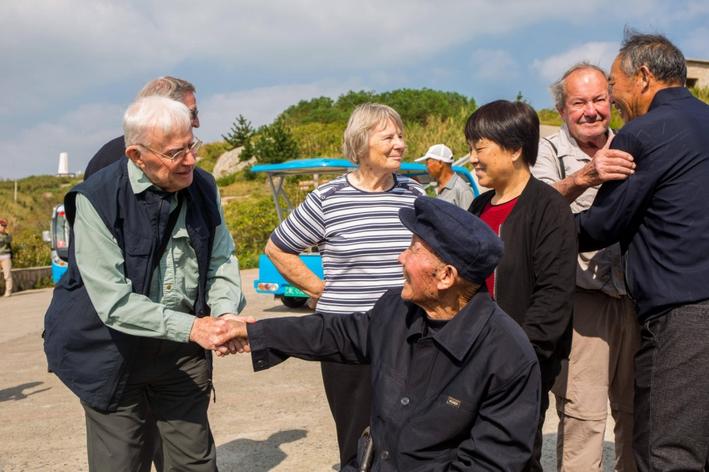Echoes of the Lisbon Maru: A Story Remembered

Agency : My first encounter with the the "Lisbon Maru" occurred in 2014. While on a marine expedition, I happened to learn that the wreck of the ship had never been precisely located. With a background in geophysics and extensive experience in marine exploration, I was immediately drawn to the challenge.
As I delved deeper into the research, I began to uncover the harrowing history behind the vessel.
In October 1942, the Japanese army requisitioned the cargo vessel "Lisbon Maru" to carry more than 1,800 British prisoners of war (POWs) from Hong Kong to Japan. In violation of international conventions, the Japanese army did not put any markings on the ship to indicate the POWs inside.
Torpedoed by the U.S. army, the vessel sank in the waters off the Zhoushan Islands in east China's Zhejiang province. As the ship went down, many British POWs who leapt into the sea were fired upon by Japanese guards. In stark contrast, local Chinese fishermen risked their lives to mount a daring rescue. After 25 agonizing hours, the "Lisbon Maru" finally disappeared beneath the waves.
As my investigation concluded, I felt the lost lives aboard the ship were silent histories awaiting witness. This conviction drove me to produce the documentary "The Sinking of the Lisbon Maru."
To reconstruct the events aboard the ship, we published notices in British newspapers such as The Times, The Telegraph, and The Guardian. Eventually, we connected with over 380 descendants of those involved, gathered more than 10,000 historical photographs, and conducted in-depth interviews with over 130 individuals, including three survivors - Private Dennis Morley of the Royal Scots, Private William Beningfield of the Middlesex Regiment, and Chinese fisherman Lin Agen, one of the rescuers.
Morley recounted with trembling hands and haunted eyes: "Without the Chinese intervention, we'd all have perished under Japanese machine gun fire.
He believed the rescuers never truly knew how many lives they had saved. His daughter, Denise Viney, was deeply moved: "Those Chinese fishermen were heroes. If they hadn't come, my father wouldn't have survived, and I wouldn't be here today."
Amid the chaos of sinking wreckage and relentless gunfire, the Chinese fishermen launched 46 boats, making 65 trips to rescue 384 British POWs. Among them was 17-year-old Lin Agen, who, together with fellow villagers, rowed a small wooden boat back and forth from dawn until midday, ultimately saving eight men.
"I was swimming toward the island, wondering how I'd climb the rocks," recalled Beningfield, tears welling in his eyes. "Then I saw a small boat approaching. I am forever grateful to the Chinese fishermen. They risked everything to save us, even though the Japanese could have retaliated against their entire village."
Tragically, all three survivors passed away before the documentary's release. But we were fortunate to preserve their testimonies while they were still alive, ensuring that this overlooked chapter of history could be brought to light.
The documentary also explores a deeper question of human nature: How do people make moral choices under extreme circumstances? Are such decisions shaped by hardship, culture, or conscience?
The Chinese fishermen answered with quiet conviction. When they saw the soaked, half-naked British POWs, they offered clothes, hot water, and food. Though their island was impoverished and farmland scarce, they gave all they could. To Lin and many of the fishermen's descendants, their actions were simply what any decent person would do.
Their compassion and courage - offered freely, without regard for personal safety - continue to resonate across time and borders. When Lin passed away in 2020, many descendants of the British POWs sent heartfelt condolences. One message read: "He leaves behind a legacy of courage, heroism, and kindness in the face of the darkest acts of war."
This year marks the 80th anniversary of the Chinese People's War of Resistance against Japanese Aggression and the World Anti-Fascist War. The "Lisbon Maru" story carries renewed relevance. It is not just a part of Chinese or British history - it is part of our shared human memory. Documenting it was a global endeavor.
British historian Tony Banham was the first to research this neglected episode. His book The Sinking of the Lisbon Maru: Britain's Forgotten Wartime Tragedy provided invaluable material for the documentary. As a filmmaker, I took up the second baton, transforming those records into a visual narrative. Now, the third baton passes to viewers worldwide. Their reflections on war, morality, and compassion help sustain a shared resonance - one that can inspire greater unity in the pursuit of peace.
The story of the Chinese fishermen and the British POWs is a vivid embodiment of a community with a shared future for mankind. Even in moments of profound danger, compassion can transcend borders. People of different nations can come together, offering each other hope, dignity, and the will to survive.
-By Fang Li














प्रतिकृया दिनुहोस